初中英语复习——动词时态
图片预览

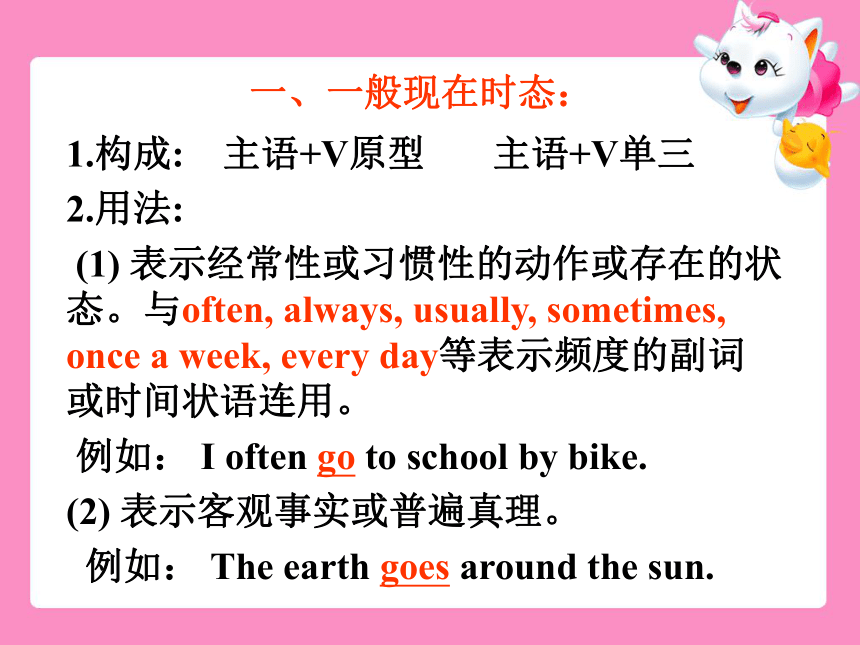
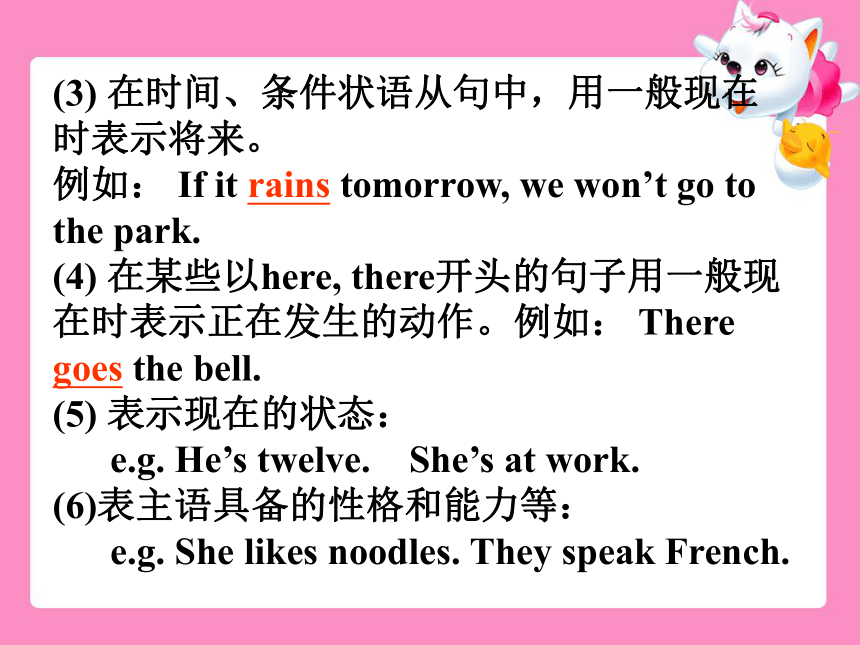
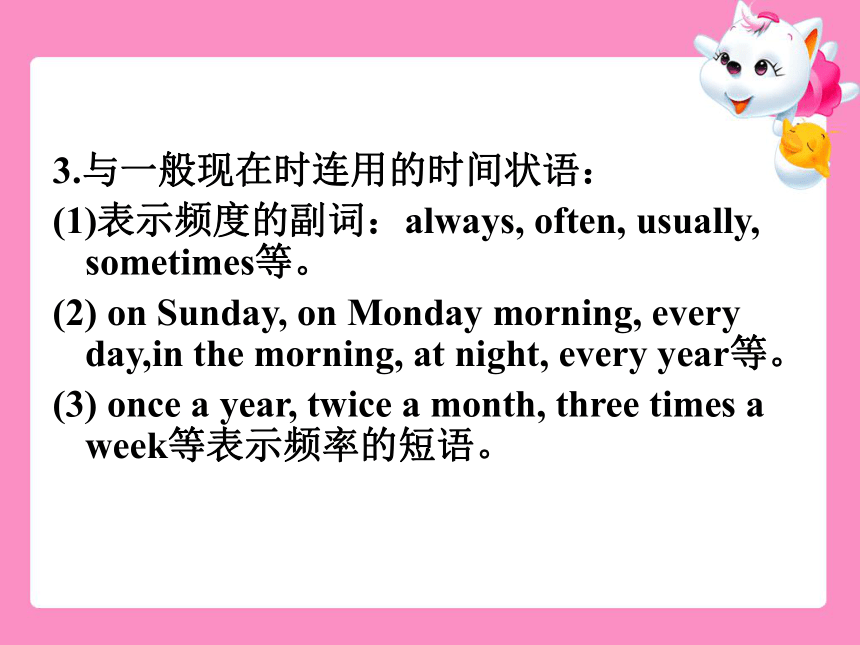
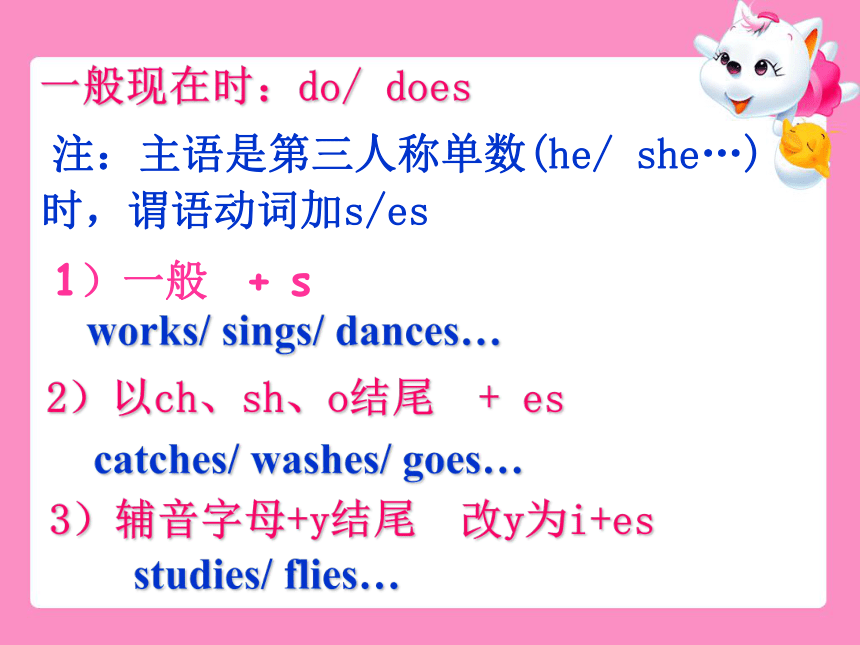

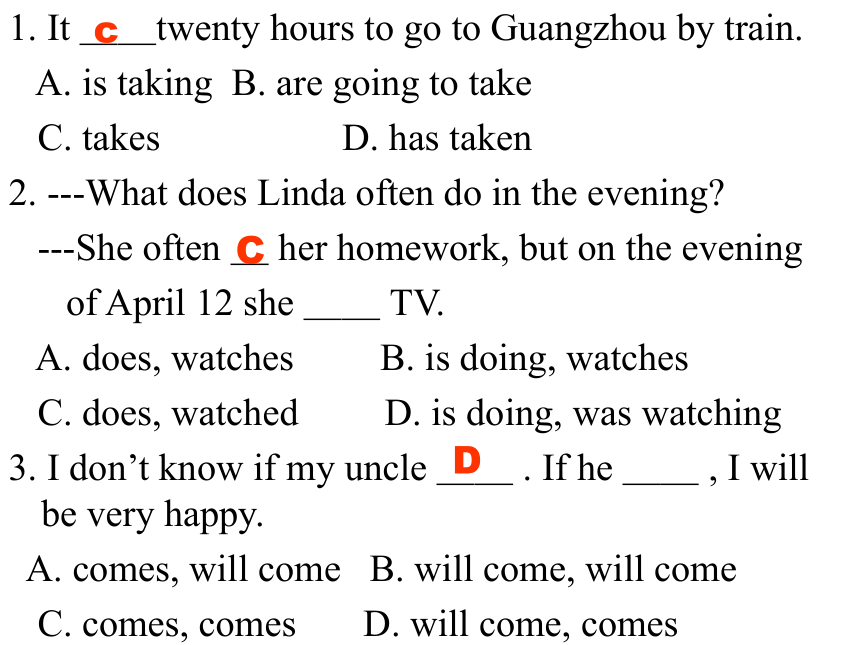
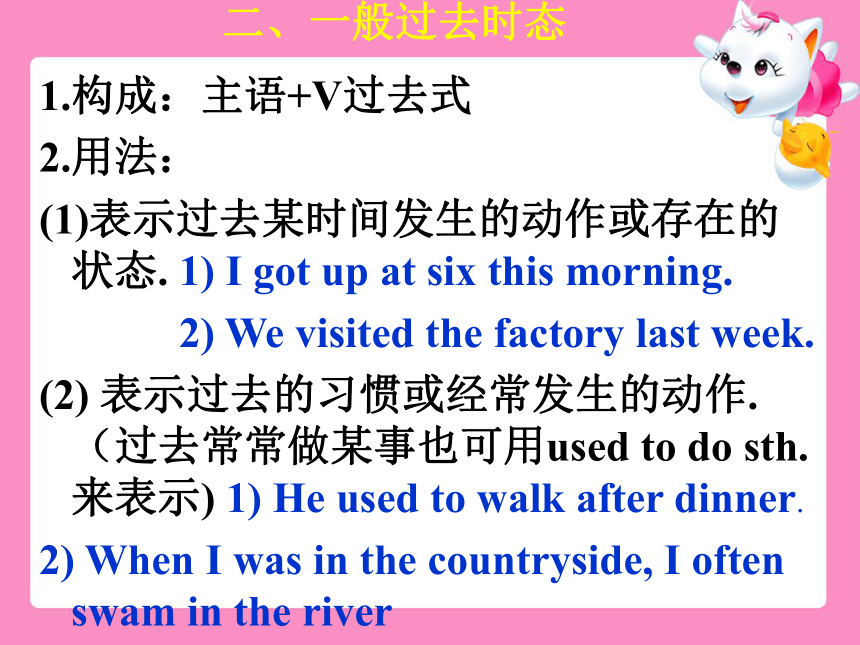
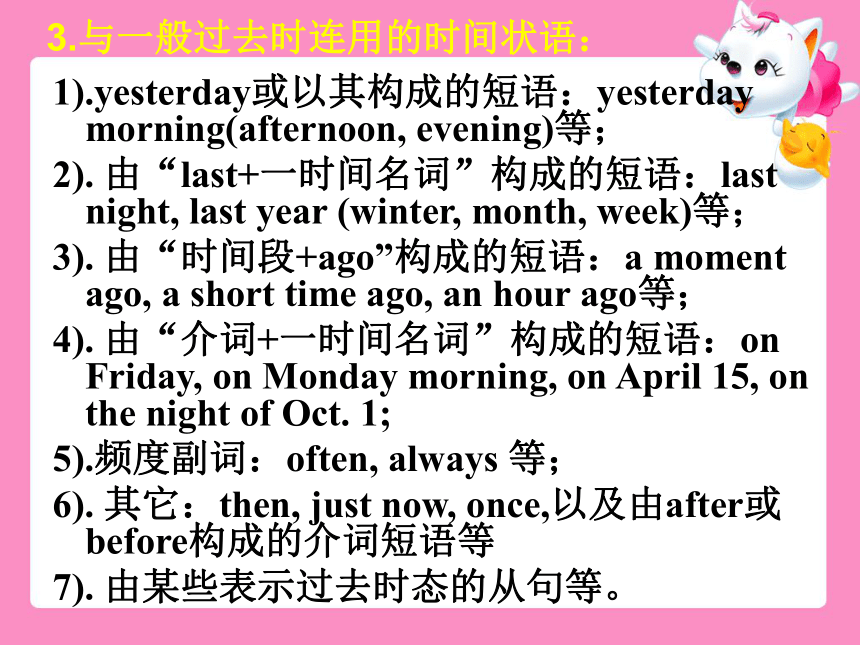
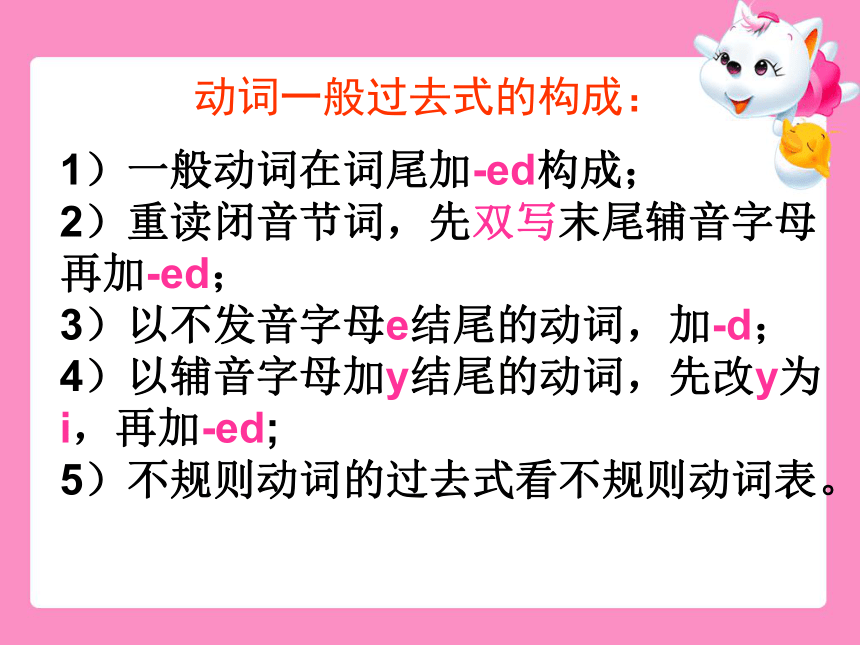
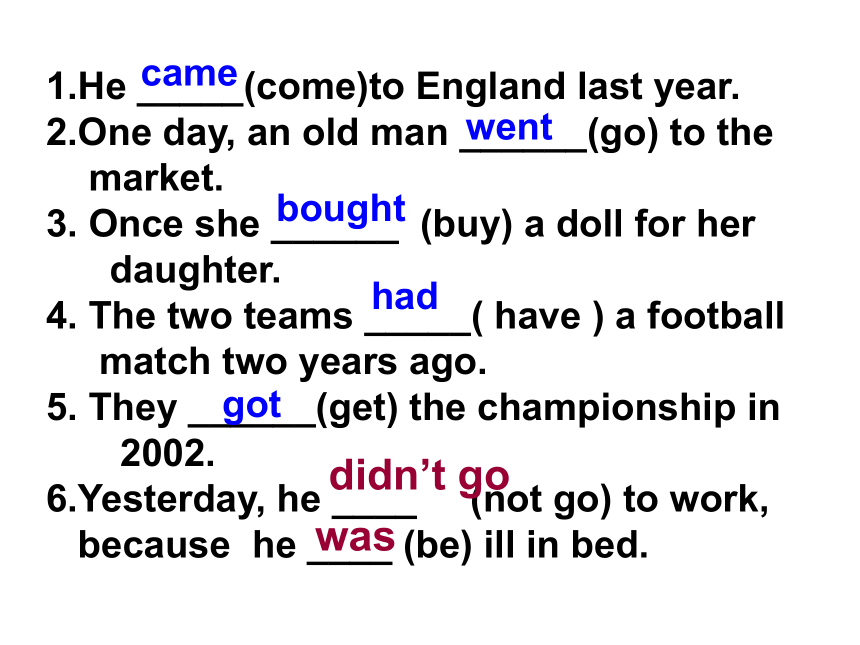
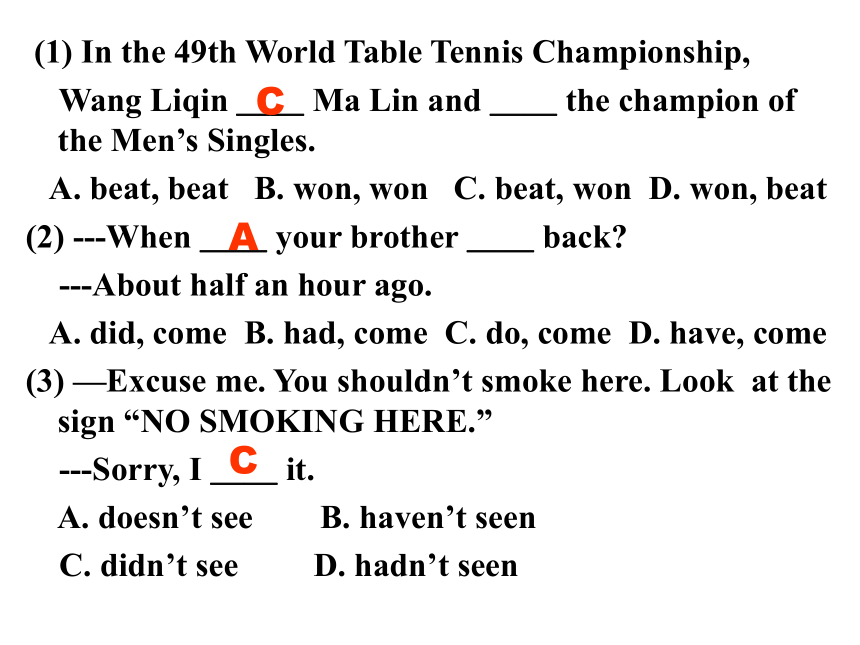
文档简介
课件78张PPT。初中英语语法动词的八种时态1.构成: 主语+V原型 主语+V单三
2.用法:
(1) 表示经常性或习惯性的动作或存在的状态。与often, always, usually, sometimes, once a week, every day等表示频度的副词或时间状语连用。
例如: I often go to school by bike.
(2) 表示客观事实或普遍真理。
例如: The earth goes around the sun.一、一般现在时态:(3) 在时间、条件状语从句中,用一般现在时表示将来。
例如: If it rains tomorrow, we won’t go to the park.
(4) 在某些以here, there开头的句子用一般现在时表示正在发生的动作。例如: There goes the bell.
(5) 表示现在的状态:
e.g. He’s twelve. She’s at work.
(6)表主语具备的性格和能力等:
e.g. She likes noodles. They speak French.
3.与一般现在时连用的时间状语:
(1)表示频度的副词:always, often, usually, sometimes等。
(2) on Sunday, on Monday morning, every day,in the morning, at night, every year等。
(3) once a year, twice a month, three times a week等表示频率的短语。
注:主语是第三人称单数(he/ she…)时,谓语动词加s/es一般现在时:do/ does1)一般 + s2)以ch、sh、o结尾 + esworks/ sings/ dances…catches/ washes/ goes…3)辅音字母+y结尾 改y为i+esstudies/ flies…用所给动词的正确形式填空:
1.There __ some milk in the bottle. (be)
2.Would you like something _________?(drink)
3.___________it like that. (not do)
4.He___________his homework at school. (not do)
5.Fang Ming _____________(not like )rice at all.
6.Do you like _______(ride) a bike?
7.We_____(go)to school at 7:30 in the morning .
8.Let me ____(help) you.
9.Don’t_______(worry)! Let me help you .
10.Can you _____(swim)? Yes ,I can .
11.Bill speaks Japanese. He ________________ (not speak) Chinese.isto drinkDon’t dodoesn’t dodoesn’t likeridinggohelpworryswimdoesn’t speak1. It __twenty hours to go to Guangzhou by train.
A. is taking B. are going to take
C. takes D. has taken
2. ---What does Linda often do in the evening?
---She often _ her homework, but on the evening
of April 12 she __ TV.
A. does, watches B. is doing, watches
C. does, watched D. is doing, was watching
3. I don’t know if my uncle __ . If he __ , I will be very happy.
A. comes, will come B. will come, will come
C. comes, comes D. will come, comesCDc1.构成:主语+V过去式
2.用法:
(1)表示过去某时间发生的动作或存在的状态. 1) I got up at six this morning.
2) We visited the factory last week.
(2) 表示过去的习惯或经常发生的动作.(过去常常做某事也可用used to do sth. 来表示) 1) He used to walk after dinner.
2) When I was in the countryside, I often swam in the river二、一般过去时态1).yesterday或以其构成的短语:yesterday morning(afternoon, evening)等;
2). 由“last+一时间名词”构成的短语:last night, last year (winter, month, week)等;
3). 由“时间段+ago”构成的短语:a moment ago, a short time ago, an hour ago等;
4). 由“介词+一时间名词”构成的短语:on Friday, on Monday morning, on April 15, on the night of Oct. 1;
5).频度副词:often, always 等;
6). 其它:then, just now, once,以及由after或before构成的介词短语等
7). 由某些表示过去时态的从句等。3.与一般过去时连用的时间状语:动词一般过去式的构成:1)一般动词在词尾加-ed构成;
2)重读闭音节词,先双写末尾辅音字母再加-ed;
3)以不发音字母e结尾的动词,加-d;
4)以辅音字母加y结尾的动词,先改y为i,再加-ed;
5)不规则动词的过去式看不规则动词表。1.He _____(come)to England last year.
2.One day, an old man ______(go) to the
market.
3. Once she ______ (buy) a doll for her
daughter.
4. The two teams _____( have ) a football
match two years ago.
5. They ______(get) the championship in
2002.
6.Yesterday, he ____ (not go) to work,
because he ____ (be) ill in bed.camewentboughthadgot didn’t go was (1) In the 49th World Table Tennis Championship,
Wang Liqin __ Ma Lin and __ the champion of the Men’s Singles.
A. beat, beat B. won, won C. beat, won D. won, beat
(2) ---When __ your brother __ back?
---About half an hour ago.
A. did, come B. had, come C. do, come D. have, come
(3) —Excuse me. You shouldn’t smoke here. Look at the sign “NO SMOKING HERE.”
---Sorry, I __ it.
A. doesn’t see B. haven’t seen
C. didn’t see D. hadn’t seenCCA1.构成:(1)will + be/do
(2) be going to + be/do
2.用法:(1)will + be/do 的用法:
① 表示将来发生的动作或存在的状态。常与表示将来的时间状语连用,如:tomorrow, next week, in a few days, next Sunday,
They will leave for Shanghai next week.
Will you be back in two days?
②当主语是I或 we时,问句中一般使用shall,表示征求对方意见。
Where shall we meet tomorrow?三、一般将来时⑵ be going to + be/do 的用法:“计划、打算做某事”,表示已决定的、很可能发生的事,或有某种迹象表明要发生的事。
--What are you going to do next Sunday?
--I’m going to listen to music.
It is reported that there is going to be a storm snow the day after tomorrow注意:在下面几种情况下只可用will (shall)表示将来,而不可用be going to 结构。
①.表示有礼貌地询问对方是否愿意或表示客气的邀请或命令时。
Will you please lend me your bike?
②.表示意愿时:
We will help him if he asks us.
③.表示单纯的将来,与人的主观愿望和判断无关时。
The sun will rise at 6:30 tomorrow morning.1) tomorrow, the day after tomorrow, later, soon, before long, from now on
2) next year /month /Friday,
3) in two weeks (in+段时间) How soon
4) in 2015,
5)在含有时间、条件状语从句的复合句中,如果主句是一般将来时,则从句用一般现在时代替一般将来时。
3.与一般将来时连用的时间状语:It __________(be) snowy in the coming days.
We ______(have) the final exam next month.
I _________ (try) my best to catch up with
others in learning English.
4. If it ______(rain) tomorrow, we __________
(not visit) that famous university.
5. In the coming new year, he __________ (go)
abroad with his family.
6. The Whites are on the plane now. They
________________________(fly) to Paris. will bewill havewill tryrainswon’t visitwill gowill fly /are flying练习
1 --The TV show Home With Kids is so wonderful . You shouldn’t miss it.
--If I have time, I _ it.
A. see B. saw C. will see D. have seen
2 I want to know if there _ an English speech contest next month. If our school _ it, I must get ready for it. A. will be, holds
B. will be, will hold C. will have, hold
3 The summer vacation will begin next week. David _ to stay with us.
A. will be coming B. comes C. came D. is comingCAD4.There___two meetings tomorrow afternoon.
are going to be B. are going to have
C. is going to be D. will have5.The twins____to the cinema with their parents tonight.
A.will go B. would go C.are go D. went6.---When____we have the meeting? ---At 8.
A. are B. shall C. would D. will 7.--When___you___for London? --Next week.
A. will; leaving B. are; leaving
C. shall; leave D. have; leftAABB1.构成:(1)was/were going to+V原型
(2)would+V原型
2.用法:
(1)表示从过去某一时间看将来发生的动作或存在的状态。常用在宾语从句中,由 “would +V原形” 引导。
He said he would buy some fruit for his sister.
He asked when the meeting would end.四、过去将来时(2) 表示曾经打算或准备要做的事,用“was/were + 动词原形”引导。
I thought it was going to rain soon.
They were going to start a new job when I saw them then.
(3) go, come, leave, arrive, start 等动词,其过去进行时表示过去按计划即将发生的动作。
1.构成:am/is/are + v-ing
2.用法:
(1)表示此时此刻正在进行的动作。
eg: -What are you doing? -I’m reading English.
(2) 表示现阶段正在进行的动作或持续的状态。
eg: 1)They are studying hard this term.
2)We arte picking apples on a farm these days.
(3) go, leave, arrive, start, visit,move 等动词用现在进行时表示将来. eg: 1)I’m going to Beijing this Sunday. 2)The bus is coming soon.五、现在进行时(4)当时间状语为now, these days等时或当句子中含有look, listen, can you see, can’t you see之类的暗示词时,要使用现在进行时。但应注意下列这些动词一般不用于现在进行时态的句子中。
a. 表示感觉的动词。如:see, hear等
b. 表示喜欢或厌恶的动词。如:like, love等
c. 表示希望的动词。如:want, would like等
d. 表示状态的动词。如:be等
e. 表示归属的动词。如:have等
f. 表示思维、知识或理解能力的动词。如:know, think, forget等Doing的构成规则:1、一般动词直接在词尾加-ing;looklookinglistenlistening2、以不发音字母“e”结尾的动词,去“e”后再加-ingcomecomingwritewriting3、以重读闭音节结尾的动词,先双写末尾的辅音字母再加-ing.putputtingstopstoppingrunrunningswimswimming4、以ie为重读音节结尾的动词,改ie为y,再加-ing.lielyingdiedyingtietying注意A.有几个瞬间动词可以用现在进行时表将来,如:begin, start, come, go, leave。1.--Lucy! Would you like to give me a hand?
--OK. I____.
A. will come B. come C. am coming D. would come2.--When____you____for Toronto? --Tomorrow. A. do; leave B. are; leaving C. will; leaving D. shall; leave1.The boy ____always ____ us! (夸赞)
A. is; helping B. does; help C. can; help D./;helpB.现在进行时和always连用,表示说话人较强烈的感彩。2.You ____ always _____ the same mistake!(责备)
A. do; make B. does; make C. is; making D. are; makingCBADChina ______________(become) stronger and stronger now.
2. Pollution ___________(get) worse and worse in this town these days.
3. Look! The famous reporter ____________ (interview) the president.
4. Listen! Someone __________(walk) towards us.
5. Chinese people _________(live) a happy life at present.is becomingis gettingis interviewingis walkingare living1.Don’t turn on the TV. Grandma _ now.
A. is sleeping B. will sleep C. slept D. sleeps
2. Listen. They _ with Mr Wang in the room.
A. chatting B. are chatting C. were chatting D. will chat
3. --Jim, please help me take out of the trash.
--OK, mom. I _ .
A. will come B. am coming C. shall come C. would come
4. He with us _ to Hawaii for summer vacation.
A. are going to B. is going to go
C. is going to D. are going to go
5.-Mike, who __ football in the yard? -Let me go and see.
A. has played B. will play C. was playing D. is playing
ABBCD7.Those workers____here these months.
A. are work B. are worked C. work D. are working6.Look!What___the children___ over there?
A. are; do B. are; doing C. is; do D. is doing 8.--How__you___along with your workmates?
--Very well.
A. do; get B.will;get C.can;get D.are;getting9.--Must I water the flowers now?
--No, you needn’t. Jack_____them.
A. is watering B. watering C. waters D. is watered BDDA1.构成: was/were + Ving
2.用法:
1)表示过去某一时刻或某一段时间内正在进行的动作。
2)用在主句为过去的宾语从句中六、过去进行时3.与过去进行时连用的时间状语:1) this time yesterday, at that time,
2) at 9:00 yesterday (过去的具体时间)
3) from 6 to 8 last Sunday (过去的一段时间)
4)when,while 引导的时间状语从句中。 注意在含有when或while引导的时间状语从句的主从复合句中过去进行时的运用:
1)主句中的动作先于从句中的动作发生,且进行的时间较长时,
主句用过去进行时(从句用一般过去时).
When the UFO arrived, I was watching TV.
2)从句中的动作先于主句中的动作发生,且进行的时间较长时,
从句用过去进行时(主句用一般过去时).
While I was walking in the street, the accident happened.
3) 若主、从句动作同时发生或无所谓先后时,主从
句可同时使用过去进行时,此时的时间状语从句一般由while引导。Mr Karter ____________(run) in the open air this time yesterday.
2.This time last year, we _______________(study) in Grade 2.
3. We _____________ (have) a maths class at 9 yesterday.
4. While they ______________(watch) TV , we _____busy_______(go) over English words.
5.When he got to the airport, the plane ___________(take) off.
6.We could see that girls’ team ______________ (win) 5-0.was runningwere studyingwere havingwere watchingwere goingwas takingwas winning1.----Nancy is not coming tonight.
----But she ____!
A.promises B.promised
C.will promise D. had promised2. Shirley ___ a book about China last year but I don’t know whether she has finished it.
A.has written B.wrote
C.had written D.was writing3.I first met Lisa three years ago.She ___ at a radio shop at the time.
A.has worked B. was working
C.had been working D.had worked4.I don’t think Jim saw me; he ___ into space.
A.just stared B.was just staring
C.has just stared D.had just stared5.As she __ the newspaper, Granny___asleep.
A.read; was falling B.was reading;fell
C.was reading;was falling D.read;fell6.---You phone number again? I __ quite catch it.
---It’s 9568442.
A. didn’t B. couldn’t C.don’t D.can’t7.--We could have walked to the station,it was so near. ----Yes,a taxi ___ at necessary.
wasn’t B. hadn’t been
C. wouldn’t be D. won’t be8.Tom ___ into the house when no one ___.
A. slipped, was looking B. had slipped, looked
C. slipped, had looked D. was slipped, looked9.The reporter said the UFO _____east to west when he saw it.
traveled B. was traveling
C. had been traveling D. was to travel10. ---Hey, look where you are going!
---Oh, I’m terribly sorry._____.
I’m not noticing B. I wasn’t noticing
C.I haven’t notice D.I don’t notice11.What a nice bike! Where ___ you ___ it?
do; buy B. have;bought C.did ; buy D. will; buy1)现在完成时态表示 过去发生的动作对现在造成的影响或结果 。
Our teacher has left .
We have studied English .
I have already finished the homework .
He has had his lunch .
He has become a doctor .Have / has + 过去分词1. 构成2. 意义七、现在完成时2)某个动作从过去已经开始, 一直持续到现在, 还有可能持续到将来,动作的 持续性要通过一段时间来表示。一段时间的表达方法有 两 种:
For : + 一段时间 for a year for two weeks for three yearsSince :过去的某一时刻, since nine since last week
一般过去时态的时间状语从句, since you came. since you got home.already, just, yet, ever, never,
so far, before, recently/lately,
2) in the past/last 3 years,
3) since+时间点,for+时间段,
4) ever since, since then,by the end of…,
5) till now, up to now,
up to the present3.与一般将来时连用的时间状语:4几个副词在现在完成时中的用法:
1) already 用于肯定句,可放在助动词之后、过去分词之前也可放在句末。
2) yet用于疑问句,表示“已经”,用于否定句,表“还”,常放在句末。
3) just“刚刚”,表示动作刚结束,常放在助动词与过去分词 之间。
4) ever“曾经”,用于疑问句或否定句中,位于助动词与过去分词之间。
5) never“从来没有”, 常与before连用,多放在助动词与过 去分词之间。
6) before“以前”,指过去不确定的某个时间,总放在句末,不受句型的限制。 ! :for 和since 所引导的时间状语都表示一段时间. 对划线部分提问都用 How long .1) He has been away since last week .2)He has been away for one week .对下列划线部分进行提问。练一练 :结束性动词不能和表示一段时间的时间状语连用,但是他可以转换成相应的延续性动词.1. 直接用 延续性动词
buy -- borrow--
catch(get) a cold –
come/go /become --
put on --have have a coldkeep bewear2. 转换成 be+名词
join the army –
Join the Party –
go to school – be a soldierbe a Party memberbe a student3. 转换成 be + 形容词或副词
die — finish –
begin — leave –
fall sleep – close – 4. 转换成 be + 介词短语
go to school –
join the army – be deadbe overbe onbe asleepbe closedbe awaybe in schoolbe in the army1.我们买这本书三年了.We have had the book for three years .2.他感冒三天了. He has had a cold for three days.We bought the book three years ago . He caught a cold three days ago.一般过去时态和现在完成时态可以构成 同意句3.自从上星期我借的这本书 I have kept the book since last week.4.我成为一个学生两年多了. I have been a student for over two years. I borrowed the book last week.I became a student two years ago.5.Mr Black死了三年了。Mr Black has been dead for three years.Mr Black died three years ago.6.小名参军半年了。Xiao Ming has been a soldier for half a year.Xiao Ming joined the army half a year ago.7.我们上了8年学了。We have been students for eight years.8.下课10分钟了。 The class has been over for ten minutes.9.电影开始了一小时了。 The film has been on for an hour.注:含延续性动词的现在完成时的同义句转换 。She began to work ten years ago.She has worked since ten years ago.It is ten years since she began to work.Ten years has passed since she began to work. She has worked for ten years.3.现在完成时和一般过去时的异同点:
共同点:动作都在过去。
不同点:和现在有无关系。(与现在有关的过去动作用现在完成,与现在无关的过去动作用一般过去。)
4.易错点:121have gone to+地点,表示“去了某地”。(人已走,尚未回。只用于第三人称。)
They have gone to Europe. (They are not here.)have been to+地点,表示“去过某地”。(人已回)(后面常接表示“次数”的单词)
I have been to Europe twice.(I am not in Europe now.)3have been in+地点+时间段,表示“在/来某地多久”。 (后面常接“for+时间段”)
I have been in Europe for three weeks.
(I am now still in Europe .)2She ___________(read) the novel several times.
_____you ever _________(be) to the Great Wall?
We _________(learn) nearly 3000 words by now.
So far, China __________ (send) up at least 6
spaceships into the space.
5.His father ______________(join) the Army since
18 years ago.
6.They ________________(not finish) building the road yet.
7.Mr White _____________(teach) French in this school during/in the past 5 years.
8.What a pity! He ___never _____ (eat) a “zongzi”!
9. I_____________ (not hear) from her recently. has readHave beenhave learnthas senthas been inhaven’t finishedhas taughthas eatenhaven’t heardExercises1.You’ve never seen such a wonderful film before, _____?
A haven’t you B have you C do you D don’t you
2. --Ann has gone to Shanghai.
---So ____ her parents.
A has B do C did D have
3. – I have watched the game.
--When ____ you ____ it?
A.have watched B.do watch
C.did watch D. will watchB D C4. Mr. Green ____ in China since five years ago.
A lived B has lived C lives D is going to live
5. His grandma ______ for two years.
A died B has been dead C was dead D has died6. –Where is Han Mei now?
--- She ____ to Shanghai. She will be back in two days.
A has gone B has been C goes D had gone
7. ---_____ to the United States ?
--- No, never,but I went to Canada a few years ago.
8. You haven’t changed your mind,_______?
A do you B are you C have you D did youBBADCA has…been B has…gone C have…benn D have…gone9. How long have you _____ the football team of the school? A been on B been at C joined D played
10. ---Where have you _____ these days?
---- I have _____ to Dazhu with my friends.
A been,gone B been,been Cgone,been Dgone,gone
11. How long have you ____ this book?
A bought B borrowed C had D lent
12. –Excuse me, ____ you seen the film yet?
--- Yes, I _____ it last night.
A have, see B have, have seen C have, seen
D have,saw
13. He has never ridden a horse before, _____?
A is he B isn’t C hasn’t D has heABCDD1.构成:had +V过去分词
2.用法:表示“过去的过去”,即在过去的某一动作之前,已经发生了另外一个动作。
1)The movie had been on for 10 minutes when I got to the cinema.
2)She had left by the time I arrived.
3)He had lived in Shanghai before he came here.
4)I had learned about 2,000 words by the end of last term. 八、过去完成时3.时间状语:
①by the time+过去的时间, by+过去的时间
②by the end of+ 过去的时间
③when + 一般过去时的句子
④before + 一般过去时的句子
⑤After + 过去完成时 ,+ 一般过去时的句子
⑥ 一般过去时(主句)+ 过去完成时(宾语从句)1.We___learning 1000 words by the end of last term.
A. finished B. have finished
C. had finished D. finish
2.The train____when we got to the station.
A. leaves B. have left C. were leaving D.had left
3.By the time he returned,his son____supper.
A. cooks B.had cooked
C.has cooked D. was cooking 过去完成时是一种相对存在的时态,判定时必须根据上下文找到一个可以作为参照点的过去时间,在此参照点前发生的动作都可以用过去完成时。注意CDD1.Tom didn't go to hear the singer because he___ him.
heard B. would hear C. has heardD. had heard2.---Why didn't you come to the party?
---I___ to come, but one of my friends came to see me just then.
A. wanted B. was wanting
C. had wanted D. had been wanted3.Sorry,I've eaten up the food. I___ that he wouldn't be back.
A. think B.was thinking
C.had thought D. thought4.When we got to his home, we learned he___ for almost an hour.
went B. had gone C. had been awayD. has gone5.---Did you meet John at the university?
---No, we___ when I started college.
have already met B. already met
C. would meet D. had already met6.When I got to the cinema, the film____ for five minutes. A. had began B. was on
C. has begun D. had been on shown7.When Jack arrived ,Mary __for almost an hour.
A.had gone B.had set off
C. had left D. had been away9.Class __by the time I ____ there, so I took a seat in the back. A. has begun, get B.had begun, got
C. began, got D. begins, get8.His wife ___ to catch the first train but she was too late.
Hoping B.had hopedC.has hopedD.would hope10.Helen ___ her key in the office so she had to wait until her husband___ home.
has left, comes B.left, had come
C. had left, came D. had left, would come11.The pen which I ___I __ is on my desk, right under my nose. A. think, lost B.thought, had lost
C. think, had lost D. thought, have lost1. He ______ a book about China last year, but I don’t know if he ______ it.
A. wrote; has finished B. was writing; has finished
C. was writing; had finished D. wrote; will finish 2. As she ___ the newspaper, Granny ___ asleep.
A. read; was falling B. was reading; fell
C. was reading; was falling D. read; fell 1. 一般过去时和过去进行时 过去进行时表当时正在进行而尚未完成的动作或状态.结论:长动作在进行时,被一个短动作打断,长动作用进行体,短动作用一般体.二、易混时态辨析2. --- Where __you __ (put) the book? I can’t see it anywhere.
--- I ___(put) it right here. But now it’s gone.
A. did ; put; put B. have; put; put
C. did; put; have put D. have; put; have put1. We haven’t heard from Jane for a long time. What do you suppose _______ to her?
A. was happening B. happens C. has happened D. happened2一般过去时与现在完成时二、易混时态辨析3. When I was at college I _______ three foreign languages but I ________ all except a few words of each.
A. spoke; had forgotten B. spoke; have forgotten
C. had spoken; had forgotten D. had spoken; have forgotten结论:一般过去时所表示的事情纯属过去,与现在情况没联系.现在完成时所表示的事情与现在情况有联系,是过去事情对现在产生的结果或对现在的影响.1.His father for Shanghai tomorrow morning.
A. is leaving B. will leave
C. leaves D. is going to leave→2.—Where you ? ---To the library.
A.have, gone B. have, been
C. are, going D. do, go →AB有些动词,如come, go, leave, fly, move, arrive等,常常用进行时态表示将要发生的动作.Has/have been to 表示曾经去过某地,现在已经回来了.
Has/have gone to 表示已经去了某地,现在人还没有回来.注意一注意二→3.Miss Wu has taught in this school______ .
A.for ten years B. ten years ago
C. since ten years D. ten years before4.It nearly two months I bought this bicycle.
A. is , that B. was, that
C. is, since D. was, since→ACfor+一段时间,如two days ,five years
since+过去的某一时间点,如two days ago,last year.或since +过去式的从句注意三注意四It 在此处指时间,谓语动词用现在时
可视为句型”It is +一段时间 since+过去式的从句 ”
5.Mariato _______ to Shanghai three days ago .
A. got B. has got C. reached D. has reached
6.Our monitor _____ to Shanghai three days before .
7.He _____ to Shanghai before.
A. has been B. had been C. was D.is
.
AB注意五→Aago用于一般过去时
before 用于完成时,和具体的过去时间连用,用过去完成时.指以前,但没有具体的时间用现在完成时.9. When he hurried home, his father had for five days. He when he was working.
A.been dead, died B. been died, died
C. died, died D. died, been deadA8.I don’t know if she ___ come .But she says she ____ to see us if she ____ free.
A. Will come, will come, will be
B.comes,comes , will be
C.comes,will come ,is D.will come ,will come ,is
D→注意六在时间状语从句和条件状语从句中,用一般现在时表示将来注意七→现在完成时与how long ,for ,since等连用时,要把短暂性动词转变为持续性动词.综合练习1.Sorry,I____to help you at ten.I was busy at the moment.
A.won't come B. can't come C. didn't come D. shouldn't come
2.He_______this pen for five years.He______it in 1997.
A.has bought,bought. B. bought, bought
C.has kept,has bought D. has had, bought
3.She____the flowers in the garden when I __ to see her yesterday.
A.watered,went B. was watering,went
C.watered,was going D. was watering,was going
4.I don 't know if my friend ______.If he _____,I'll let you know.
A.comes,comes B. comes, will come
C.will come, comes D. will come,will comeCDBC5.John said he_____ supper.He was quite full.
A.had had B. was having C. had D. has eaten
6.There_________two parties next week.
A. are going to be B. are going to have
C. is going to be D. will have
7.It______10 years since I ______ here.
A. is, come B. is, have come C. was, came D. is, came
8.--Kate likes eating chocolate.
--____. Look, she is eating
A.So Lucy does B. So does Lucy
C.So they do D. So do they
9.Kate_______to bed until her mother _______ back.
A.won't go, come B. hadn't gone, came
C. went, came D. didn't go, cameDAADB10.His brother _____ from home for a long time.
A.has left B. has been away C. left D. will leave
11.--Lucy,___you____your ticket? --Not yet. A.did;find B.have;found C.has;found D. do; find
12.--____to the United States?
--No, never, but I went to Canada a few years ago.
A. Have you been B. Have you gone
C. Did you go D. Have you went
13.The man who lived on the island thought he___ never____. A.will; found B. would; be found
C. is; found B. had; been found
14.--I don’t know if his uncle____.
--I think he___if it doesn’t rain.
A. will come; comes B. will come; will come
C. comes; comes D. comes; will comeBBADB15.--Linda had nothing for breakfast this morning,__?
--No,she got up too late
A. had she B. hadn’t she C. did she D. didn’t she
16.The flowers____well if they____.
A. won’t grow; don’t take good care of
B. don’t grow; are taken good care of
C. won’t grow; are not taken care of
D. don’t grow; don’t take care of
17.--Hurry up! It’s time to leave. --OK,____.
A. I’m coming B. I’ll come C. I’ve come D.I come
18.There____an English evening next Tuesday.
A. was B. will be C. will have D. are going to be
19. I must return the camera to Li Lei, I________it for two weeks.
A. keep B. borrowed C. have kept D. have lentCCABC20.--When__ this kind of computer__? --Last year.
A. did; use B. was; used C. is; used D. are; used
21.--Jerry,____you____your lost book? --Not yet.
A. did; find B. have; found C. has; found D. do; find
22.--Don’t forget to post this letter for me, please!
--No, I____.
A. don’t B. won’t C. mustn’t D. can’t
23.Do you know if____back next week? If he____back, please let me know.
A. he comes, will come B. will he come; comes
C. he will come; comes D. will he come, will come
24. My mother_________the windows already,so the room looks much brighter. ?
A.has cleaned B.had cleaned?
C.is cleaning D.will cleanBBBCA1.---How often Jack to China? ---Twice a year.
is ; travelling B. will, travel
C. has, travelled D.does, travel
2. --How long have you the English magazine?
--Just three days.
A. borrowed B. lent C. kept D.bought
3.The football match already when we there.
has, begun, got B. will, start, get
C. had, started, got D. have, got, reach
4.-----I have finished my homework.
------When you it ?
have, finished B. do, finish C. did, finish D. will, finish
5. You_________to the meeting.Why didn't you go?
A.be invited B.will be invited?
C.were invited D.are invitedDCCCC6.---Did she say she would come?
---Yes.But she didn’t say if she speak at the meeting.
A. is B. is going to C. will D. would
7.--Excuse me. Look at the sign:NO SMOKING!
--Sorry, I it.
A. don’t see B. didn’t see C. haven’t seen D. won’t see
8.--Where’s Ann, Tom?
--In the teacher’s office. She with the teacher.
A. talks B.talked C. has talked D. is talking
9.--Do you know him well?
--Sure. We friends since he came to our school.
A. were B. have been C. have become D. have made
10.--Have you ever Hanan Island ?
--No, never.
A. been B. been to C. gone D. gone to DBDBB课时训练Ⅰ.用所给动词的适当形式填空。?
1.My brother isn't at home right now.He ___________(go)to Beijing.He___________(be) there many tines.He _________
(not be) back until next week.?
2.When I got home,my mother__________(go)out for a walk.?
3.He____________(finish)his composition just now.?
4.By the end of next month,all our lessons______________
(finish).?
5. ______she _____(do) morning exercises every day?? has gonehas beenwon't behad gone finished will be finished Does do 课时训练6.In the part few years,another bridge _____________
(build)over the Changjiang River.?
7.She________ (watch)TV while she______________
(wash) her clothes.?
8.He said he_________ (give)her the present as soon as she ________(come)back.?
9.Listen!Someone____________(sing)in the next room.?
10.Our teacher told us the earth_______(go) around the sun.? ? has been built watched was washingwould give came is singing goes Ⅱ.单项选择
1.Sorry,I____to help you at ten.I was busy at the momen?
A.won't come B.can't come?
C.didn't come D.shouldn't come?
2.He_______this pen for five years.He______it in 1997.?
A.has bought,bought. B.bought,bought?
C.has kept,has bought D.has had,bought?
3.She_________apples in her garden when I_________to see her yesterday.?
A.picked,went B.was picking, went?
C.picked,was going D.was picking,was going?
4.I don 't know if my friend_________.If he _________,I'll let you know.?
A.comes,comes B.comes, will come?
C.will come,comes D.will come,will come?
5.John said he_________ supper.He was quite full.?
A.had had B.was haring? C.had D.has eaten? 课时训练CDBCA6.There_________two meetings tomorrow afternoon.?
A.are going to be B.are going to have?
C.is going to be D.will have?
7.It______3 years since I______to No.1 Middle School.?
A.is,come B.is,have come?
C.was,came D.is,came?
8.Father_________when I _________yesterday morning.?
A.still slept,got up? B.was still sleeping,got up?
C.is sleeping,got up? D.sleeps,get up?
9.Kate_________to bed until her mother_________back.?
A.won't go,come B.hadn't gone came?
C.went,came D.didn't go,came?
10.His brother_________from home for a long time.?
A.has left B.has been away?
C.left D.will leave? 课时训练(A)(D)(B)(D)(B)11.It_________7 hours to go to Nanjing by train.?
A.takes B.is taking? C.has taken D.took?
12.—How much do you want??
—I think ten dollars_________ enough.?
A.is B.are? C.has been D.have been?
13.There'll be an important talk tomorrow morning.
_________ on time.?
A.Do come B.Don't come?
C.Do to come D.Not to come
14.Though we tried our best.We_________at last.?
A.won B.beat
? C.were won D.were beaten?
15.Why do you keep_________these new words??
A.forget B.forgetting?
C.to forget D.forgot? 课时训练AADAB Pat liked to make things. She _____ (like)to work with her hands. She said,” Today I _________ (make) a face.” Pat worked and _______ (work). Soon she had made a nice face. When it was ____ (do), Pat said, “This is a good face. This ____ (be) my face!” Pat was very pleased.
“Please read me a story,” said Ana. Grandfather was going ______(read) her the story, Three Little Pigs. Ana said, “I ___________ (hear) about the story. Please read me another one.” Grandfather read her a new one.
“How did you like the story, Ana? Are you _______ (listen) to me now?” asked Grandfather. Ana _____________ (not answer)Grandfather looked at Ana and began to laugh. Ana was not listening at all. She ____________(sleep) there.likedwill makeworkeddoneisto readhave heardlisteningdidn’t answerwas sleeping
2.用法:
(1) 表示经常性或习惯性的动作或存在的状态。与often, always, usually, sometimes, once a week, every day等表示频度的副词或时间状语连用。
例如: I often go to school by bike.
(2) 表示客观事实或普遍真理。
例如: The earth goes around the sun.一、一般现在时态:(3) 在时间、条件状语从句中,用一般现在时表示将来。
例如: If it rains tomorrow, we won’t go to the park.
(4) 在某些以here, there开头的句子用一般现在时表示正在发生的动作。例如: There goes the bell.
(5) 表示现在的状态:
e.g. He’s twelve. She’s at work.
(6)表主语具备的性格和能力等:
e.g. She likes noodles. They speak French.
3.与一般现在时连用的时间状语:
(1)表示频度的副词:always, often, usually, sometimes等。
(2) on Sunday, on Monday morning, every day,in the morning, at night, every year等。
(3) once a year, twice a month, three times a week等表示频率的短语。
注:主语是第三人称单数(he/ she…)时,谓语动词加s/es一般现在时:do/ does1)一般 + s2)以ch、sh、o结尾 + esworks/ sings/ dances…catches/ washes/ goes…3)辅音字母+y结尾 改y为i+esstudies/ flies…用所给动词的正确形式填空:
1.There __ some milk in the bottle. (be)
2.Would you like something _________?(drink)
3.___________it like that. (not do)
4.He___________his homework at school. (not do)
5.Fang Ming _____________(not like )rice at all.
6.Do you like _______(ride) a bike?
7.We_____(go)to school at 7:30 in the morning .
8.Let me ____(help) you.
9.Don’t_______(worry)! Let me help you .
10.Can you _____(swim)? Yes ,I can .
11.Bill speaks Japanese. He ________________ (not speak) Chinese.isto drinkDon’t dodoesn’t dodoesn’t likeridinggohelpworryswimdoesn’t speak1. It __twenty hours to go to Guangzhou by train.
A. is taking B. are going to take
C. takes D. has taken
2. ---What does Linda often do in the evening?
---She often _ her homework, but on the evening
of April 12 she __ TV.
A. does, watches B. is doing, watches
C. does, watched D. is doing, was watching
3. I don’t know if my uncle __ . If he __ , I will be very happy.
A. comes, will come B. will come, will come
C. comes, comes D. will come, comesCDc1.构成:主语+V过去式
2.用法:
(1)表示过去某时间发生的动作或存在的状态. 1) I got up at six this morning.
2) We visited the factory last week.
(2) 表示过去的习惯或经常发生的动作.(过去常常做某事也可用used to do sth. 来表示) 1) He used to walk after dinner.
2) When I was in the countryside, I often swam in the river二、一般过去时态1).yesterday或以其构成的短语:yesterday morning(afternoon, evening)等;
2). 由“last+一时间名词”构成的短语:last night, last year (winter, month, week)等;
3). 由“时间段+ago”构成的短语:a moment ago, a short time ago, an hour ago等;
4). 由“介词+一时间名词”构成的短语:on Friday, on Monday morning, on April 15, on the night of Oct. 1;
5).频度副词:often, always 等;
6). 其它:then, just now, once,以及由after或before构成的介词短语等
7). 由某些表示过去时态的从句等。3.与一般过去时连用的时间状语:动词一般过去式的构成:1)一般动词在词尾加-ed构成;
2)重读闭音节词,先双写末尾辅音字母再加-ed;
3)以不发音字母e结尾的动词,加-d;
4)以辅音字母加y结尾的动词,先改y为i,再加-ed;
5)不规则动词的过去式看不规则动词表。1.He _____(come)to England last year.
2.One day, an old man ______(go) to the
market.
3. Once she ______ (buy) a doll for her
daughter.
4. The two teams _____( have ) a football
match two years ago.
5. They ______(get) the championship in
2002.
6.Yesterday, he ____ (not go) to work,
because he ____ (be) ill in bed.camewentboughthadgot didn’t go was (1) In the 49th World Table Tennis Championship,
Wang Liqin __ Ma Lin and __ the champion of the Men’s Singles.
A. beat, beat B. won, won C. beat, won D. won, beat
(2) ---When __ your brother __ back?
---About half an hour ago.
A. did, come B. had, come C. do, come D. have, come
(3) —Excuse me. You shouldn’t smoke here. Look at the sign “NO SMOKING HERE.”
---Sorry, I __ it.
A. doesn’t see B. haven’t seen
C. didn’t see D. hadn’t seenCCA1.构成:(1)will + be/do
(2) be going to + be/do
2.用法:(1)will + be/do 的用法:
① 表示将来发生的动作或存在的状态。常与表示将来的时间状语连用,如:tomorrow, next week, in a few days, next Sunday,
They will leave for Shanghai next week.
Will you be back in two days?
②当主语是I或 we时,问句中一般使用shall,表示征求对方意见。
Where shall we meet tomorrow?三、一般将来时⑵ be going to + be/do 的用法:“计划、打算做某事”,表示已决定的、很可能发生的事,或有某种迹象表明要发生的事。
--What are you going to do next Sunday?
--I’m going to listen to music.
It is reported that there is going to be a storm snow the day after tomorrow注意:在下面几种情况下只可用will (shall)表示将来,而不可用be going to 结构。
①.表示有礼貌地询问对方是否愿意或表示客气的邀请或命令时。
Will you please lend me your bike?
②.表示意愿时:
We will help him if he asks us.
③.表示单纯的将来,与人的主观愿望和判断无关时。
The sun will rise at 6:30 tomorrow morning.1) tomorrow, the day after tomorrow, later, soon, before long, from now on
2) next year /month /Friday,
3) in two weeks (in+段时间) How soon
4) in 2015,
5)在含有时间、条件状语从句的复合句中,如果主句是一般将来时,则从句用一般现在时代替一般将来时。
3.与一般将来时连用的时间状语:It __________(be) snowy in the coming days.
We ______(have) the final exam next month.
I _________ (try) my best to catch up with
others in learning English.
4. If it ______(rain) tomorrow, we __________
(not visit) that famous university.
5. In the coming new year, he __________ (go)
abroad with his family.
6. The Whites are on the plane now. They
________________________(fly) to Paris. will bewill havewill tryrainswon’t visitwill gowill fly /are flying练习
1 --The TV show Home With Kids is so wonderful . You shouldn’t miss it.
--If I have time, I _ it.
A. see B. saw C. will see D. have seen
2 I want to know if there _ an English speech contest next month. If our school _ it, I must get ready for it. A. will be, holds
B. will be, will hold C. will have, hold
3 The summer vacation will begin next week. David _ to stay with us.
A. will be coming B. comes C. came D. is comingCAD4.There___two meetings tomorrow afternoon.
are going to be B. are going to have
C. is going to be D. will have5.The twins____to the cinema with their parents tonight.
A.will go B. would go C.are go D. went6.---When____we have the meeting? ---At 8.
A. are B. shall C. would D. will 7.--When___you___for London? --Next week.
A. will; leaving B. are; leaving
C. shall; leave D. have; leftAABB1.构成:(1)was/were going to+V原型
(2)would+V原型
2.用法:
(1)表示从过去某一时间看将来发生的动作或存在的状态。常用在宾语从句中,由 “would +V原形” 引导。
He said he would buy some fruit for his sister.
He asked when the meeting would end.四、过去将来时(2) 表示曾经打算或准备要做的事,用“was/were + 动词原形”引导。
I thought it was going to rain soon.
They were going to start a new job when I saw them then.
(3) go, come, leave, arrive, start 等动词,其过去进行时表示过去按计划即将发生的动作。
1.构成:am/is/are + v-ing
2.用法:
(1)表示此时此刻正在进行的动作。
eg: -What are you doing? -I’m reading English.
(2) 表示现阶段正在进行的动作或持续的状态。
eg: 1)They are studying hard this term.
2)We arte picking apples on a farm these days.
(3) go, leave, arrive, start, visit,move 等动词用现在进行时表示将来. eg: 1)I’m going to Beijing this Sunday. 2)The bus is coming soon.五、现在进行时(4)当时间状语为now, these days等时或当句子中含有look, listen, can you see, can’t you see之类的暗示词时,要使用现在进行时。但应注意下列这些动词一般不用于现在进行时态的句子中。
a. 表示感觉的动词。如:see, hear等
b. 表示喜欢或厌恶的动词。如:like, love等
c. 表示希望的动词。如:want, would like等
d. 表示状态的动词。如:be等
e. 表示归属的动词。如:have等
f. 表示思维、知识或理解能力的动词。如:know, think, forget等Doing的构成规则:1、一般动词直接在词尾加-ing;looklookinglistenlistening2、以不发音字母“e”结尾的动词,去“e”后再加-ingcomecomingwritewriting3、以重读闭音节结尾的动词,先双写末尾的辅音字母再加-ing.putputtingstopstoppingrunrunningswimswimming4、以ie为重读音节结尾的动词,改ie为y,再加-ing.lielyingdiedyingtietying注意A.有几个瞬间动词可以用现在进行时表将来,如:begin, start, come, go, leave。1.--Lucy! Would you like to give me a hand?
--OK. I____.
A. will come B. come C. am coming D. would come2.--When____you____for Toronto? --Tomorrow. A. do; leave B. are; leaving C. will; leaving D. shall; leave1.The boy ____always ____ us! (夸赞)
A. is; helping B. does; help C. can; help D./;helpB.现在进行时和always连用,表示说话人较强烈的感彩。2.You ____ always _____ the same mistake!(责备)
A. do; make B. does; make C. is; making D. are; makingCBADChina ______________(become) stronger and stronger now.
2. Pollution ___________(get) worse and worse in this town these days.
3. Look! The famous reporter ____________ (interview) the president.
4. Listen! Someone __________(walk) towards us.
5. Chinese people _________(live) a happy life at present.is becomingis gettingis interviewingis walkingare living1.Don’t turn on the TV. Grandma _ now.
A. is sleeping B. will sleep C. slept D. sleeps
2. Listen. They _ with Mr Wang in the room.
A. chatting B. are chatting C. were chatting D. will chat
3. --Jim, please help me take out of the trash.
--OK, mom. I _ .
A. will come B. am coming C. shall come C. would come
4. He with us _ to Hawaii for summer vacation.
A. are going to B. is going to go
C. is going to D. are going to go
5.-Mike, who __ football in the yard? -Let me go and see.
A. has played B. will play C. was playing D. is playing
ABBCD7.Those workers____here these months.
A. are work B. are worked C. work D. are working6.Look!What___the children___ over there?
A. are; do B. are; doing C. is; do D. is doing 8.--How__you___along with your workmates?
--Very well.
A. do; get B.will;get C.can;get D.are;getting9.--Must I water the flowers now?
--No, you needn’t. Jack_____them.
A. is watering B. watering C. waters D. is watered BDDA1.构成: was/were + Ving
2.用法:
1)表示过去某一时刻或某一段时间内正在进行的动作。
2)用在主句为过去的宾语从句中六、过去进行时3.与过去进行时连用的时间状语:1) this time yesterday, at that time,
2) at 9:00 yesterday (过去的具体时间)
3) from 6 to 8 last Sunday (过去的一段时间)
4)when,while 引导的时间状语从句中。 注意在含有when或while引导的时间状语从句的主从复合句中过去进行时的运用:
1)主句中的动作先于从句中的动作发生,且进行的时间较长时,
主句用过去进行时(从句用一般过去时).
When the UFO arrived, I was watching TV.
2)从句中的动作先于主句中的动作发生,且进行的时间较长时,
从句用过去进行时(主句用一般过去时).
While I was walking in the street, the accident happened.
3) 若主、从句动作同时发生或无所谓先后时,主从
句可同时使用过去进行时,此时的时间状语从句一般由while引导。Mr Karter ____________(run) in the open air this time yesterday.
2.This time last year, we _______________(study) in Grade 2.
3. We _____________ (have) a maths class at 9 yesterday.
4. While they ______________(watch) TV , we _____busy_______(go) over English words.
5.When he got to the airport, the plane ___________(take) off.
6.We could see that girls’ team ______________ (win) 5-0.was runningwere studyingwere havingwere watchingwere goingwas takingwas winning1.----Nancy is not coming tonight.
----But she ____!
A.promises B.promised
C.will promise D. had promised2. Shirley ___ a book about China last year but I don’t know whether she has finished it.
A.has written B.wrote
C.had written D.was writing3.I first met Lisa three years ago.She ___ at a radio shop at the time.
A.has worked B. was working
C.had been working D.had worked4.I don’t think Jim saw me; he ___ into space.
A.just stared B.was just staring
C.has just stared D.had just stared5.As she __ the newspaper, Granny___asleep.
A.read; was falling B.was reading;fell
C.was reading;was falling D.read;fell6.---You phone number again? I __ quite catch it.
---It’s 9568442.
A. didn’t B. couldn’t C.don’t D.can’t7.--We could have walked to the station,it was so near. ----Yes,a taxi ___ at necessary.
wasn’t B. hadn’t been
C. wouldn’t be D. won’t be8.Tom ___ into the house when no one ___.
A. slipped, was looking B. had slipped, looked
C. slipped, had looked D. was slipped, looked9.The reporter said the UFO _____east to west when he saw it.
traveled B. was traveling
C. had been traveling D. was to travel10. ---Hey, look where you are going!
---Oh, I’m terribly sorry._____.
I’m not noticing B. I wasn’t noticing
C.I haven’t notice D.I don’t notice11.What a nice bike! Where ___ you ___ it?
do; buy B. have;bought C.did ; buy D. will; buy1)现在完成时态表示 过去发生的动作对现在造成的影响或结果 。
Our teacher has left .
We have studied English .
I have already finished the homework .
He has had his lunch .
He has become a doctor .Have / has + 过去分词1. 构成2. 意义七、现在完成时2)某个动作从过去已经开始, 一直持续到现在, 还有可能持续到将来,动作的 持续性要通过一段时间来表示。一段时间的表达方法有 两 种:
For : + 一段时间 for a year for two weeks for three yearsSince :过去的某一时刻, since nine since last week
一般过去时态的时间状语从句, since you came. since you got home.already, just, yet, ever, never,
so far, before, recently/lately,
2) in the past/last 3 years,
3) since+时间点,for+时间段,
4) ever since, since then,by the end of…,
5) till now, up to now,
up to the present3.与一般将来时连用的时间状语:4几个副词在现在完成时中的用法:
1) already 用于肯定句,可放在助动词之后、过去分词之前也可放在句末。
2) yet用于疑问句,表示“已经”,用于否定句,表“还”,常放在句末。
3) just“刚刚”,表示动作刚结束,常放在助动词与过去分词 之间。
4) ever“曾经”,用于疑问句或否定句中,位于助动词与过去分词之间。
5) never“从来没有”, 常与before连用,多放在助动词与过 去分词之间。
6) before“以前”,指过去不确定的某个时间,总放在句末,不受句型的限制。 ! :for 和since 所引导的时间状语都表示一段时间. 对划线部分提问都用 How long .1) He has been away since last week .2)He has been away for one week .对下列划线部分进行提问。练一练 :结束性动词不能和表示一段时间的时间状语连用,但是他可以转换成相应的延续性动词.1. 直接用 延续性动词
buy -- borrow--
catch(get) a cold –
come/go /become --
put on --have have a coldkeep bewear2. 转换成 be+名词
join the army –
Join the Party –
go to school – be a soldierbe a Party memberbe a student3. 转换成 be + 形容词或副词
die — finish –
begin — leave –
fall sleep – close – 4. 转换成 be + 介词短语
go to school –
join the army – be deadbe overbe onbe asleepbe closedbe awaybe in schoolbe in the army1.我们买这本书三年了.We have had the book for three years .2.他感冒三天了. He has had a cold for three days.We bought the book three years ago . He caught a cold three days ago.一般过去时态和现在完成时态可以构成 同意句3.自从上星期我借的这本书 I have kept the book since last week.4.我成为一个学生两年多了. I have been a student for over two years. I borrowed the book last week.I became a student two years ago.5.Mr Black死了三年了。Mr Black has been dead for three years.Mr Black died three years ago.6.小名参军半年了。Xiao Ming has been a soldier for half a year.Xiao Ming joined the army half a year ago.7.我们上了8年学了。We have been students for eight years.8.下课10分钟了。 The class has been over for ten minutes.9.电影开始了一小时了。 The film has been on for an hour.注:含延续性动词的现在完成时的同义句转换 。She began to work ten years ago.She has worked since ten years ago.It is ten years since she began to work.Ten years has passed since she began to work. She has worked for ten years.3.现在完成时和一般过去时的异同点:
共同点:动作都在过去。
不同点:和现在有无关系。(与现在有关的过去动作用现在完成,与现在无关的过去动作用一般过去。)
4.易错点:121have gone to+地点,表示“去了某地”。(人已走,尚未回。只用于第三人称。)
They have gone to Europe. (They are not here.)have been to+地点,表示“去过某地”。(人已回)(后面常接表示“次数”的单词)
I have been to Europe twice.(I am not in Europe now.)3have been in+地点+时间段,表示“在/来某地多久”。 (后面常接“for+时间段”)
I have been in Europe for three weeks.
(I am now still in Europe .)2She ___________(read) the novel several times.
_____you ever _________(be) to the Great Wall?
We _________(learn) nearly 3000 words by now.
So far, China __________ (send) up at least 6
spaceships into the space.
5.His father ______________(join) the Army since
18 years ago.
6.They ________________(not finish) building the road yet.
7.Mr White _____________(teach) French in this school during/in the past 5 years.
8.What a pity! He ___never _____ (eat) a “zongzi”!
9. I_____________ (not hear) from her recently. has readHave beenhave learnthas senthas been inhaven’t finishedhas taughthas eatenhaven’t heardExercises1.You’ve never seen such a wonderful film before, _____?
A haven’t you B have you C do you D don’t you
2. --Ann has gone to Shanghai.
---So ____ her parents.
A has B do C did D have
3. – I have watched the game.
--When ____ you ____ it?
A.have watched B.do watch
C.did watch D. will watchB D C4. Mr. Green ____ in China since five years ago.
A lived B has lived C lives D is going to live
5. His grandma ______ for two years.
A died B has been dead C was dead D has died6. –Where is Han Mei now?
--- She ____ to Shanghai. She will be back in two days.
A has gone B has been C goes D had gone
7. ---_____ to the United States ?
--- No, never,but I went to Canada a few years ago.
8. You haven’t changed your mind,_______?
A do you B are you C have you D did youBBADCA has…been B has…gone C have…benn D have…gone9. How long have you _____ the football team of the school? A been on B been at C joined D played
10. ---Where have you _____ these days?
---- I have _____ to Dazhu with my friends.
A been,gone B been,been Cgone,been Dgone,gone
11. How long have you ____ this book?
A bought B borrowed C had D lent
12. –Excuse me, ____ you seen the film yet?
--- Yes, I _____ it last night.
A have, see B have, have seen C have, seen
D have,saw
13. He has never ridden a horse before, _____?
A is he B isn’t C hasn’t D has heABCDD1.构成:had +V过去分词
2.用法:表示“过去的过去”,即在过去的某一动作之前,已经发生了另外一个动作。
1)The movie had been on for 10 minutes when I got to the cinema.
2)She had left by the time I arrived.
3)He had lived in Shanghai before he came here.
4)I had learned about 2,000 words by the end of last term. 八、过去完成时3.时间状语:
①by the time+过去的时间, by+过去的时间
②by the end of+ 过去的时间
③when + 一般过去时的句子
④before + 一般过去时的句子
⑤After + 过去完成时 ,+ 一般过去时的句子
⑥ 一般过去时(主句)+ 过去完成时(宾语从句)1.We___learning 1000 words by the end of last term.
A. finished B. have finished
C. had finished D. finish
2.The train____when we got to the station.
A. leaves B. have left C. were leaving D.had left
3.By the time he returned,his son____supper.
A. cooks B.had cooked
C.has cooked D. was cooking 过去完成时是一种相对存在的时态,判定时必须根据上下文找到一个可以作为参照点的过去时间,在此参照点前发生的动作都可以用过去完成时。注意CDD1.Tom didn't go to hear the singer because he___ him.
heard B. would hear C. has heardD. had heard2.---Why didn't you come to the party?
---I___ to come, but one of my friends came to see me just then.
A. wanted B. was wanting
C. had wanted D. had been wanted3.Sorry,I've eaten up the food. I___ that he wouldn't be back.
A. think B.was thinking
C.had thought D. thought4.When we got to his home, we learned he___ for almost an hour.
went B. had gone C. had been awayD. has gone5.---Did you meet John at the university?
---No, we___ when I started college.
have already met B. already met
C. would meet D. had already met6.When I got to the cinema, the film____ for five minutes. A. had began B. was on
C. has begun D. had been on shown7.When Jack arrived ,Mary __for almost an hour.
A.had gone B.had set off
C. had left D. had been away9.Class __by the time I ____ there, so I took a seat in the back. A. has begun, get B.had begun, got
C. began, got D. begins, get8.His wife ___ to catch the first train but she was too late.
Hoping B.had hopedC.has hopedD.would hope10.Helen ___ her key in the office so she had to wait until her husband___ home.
has left, comes B.left, had come
C. had left, came D. had left, would come11.The pen which I ___I __ is on my desk, right under my nose. A. think, lost B.thought, had lost
C. think, had lost D. thought, have lost1. He ______ a book about China last year, but I don’t know if he ______ it.
A. wrote; has finished B. was writing; has finished
C. was writing; had finished D. wrote; will finish 2. As she ___ the newspaper, Granny ___ asleep.
A. read; was falling B. was reading; fell
C. was reading; was falling D. read; fell 1. 一般过去时和过去进行时 过去进行时表当时正在进行而尚未完成的动作或状态.结论:长动作在进行时,被一个短动作打断,长动作用进行体,短动作用一般体.二、易混时态辨析2. --- Where __you __ (put) the book? I can’t see it anywhere.
--- I ___(put) it right here. But now it’s gone.
A. did ; put; put B. have; put; put
C. did; put; have put D. have; put; have put1. We haven’t heard from Jane for a long time. What do you suppose _______ to her?
A. was happening B. happens C. has happened D. happened2一般过去时与现在完成时二、易混时态辨析3. When I was at college I _______ three foreign languages but I ________ all except a few words of each.
A. spoke; had forgotten B. spoke; have forgotten
C. had spoken; had forgotten D. had spoken; have forgotten结论:一般过去时所表示的事情纯属过去,与现在情况没联系.现在完成时所表示的事情与现在情况有联系,是过去事情对现在产生的结果或对现在的影响.1.His father for Shanghai tomorrow morning.
A. is leaving B. will leave
C. leaves D. is going to leave→2.—Where you ? ---To the library.
A.have, gone B. have, been
C. are, going D. do, go →AB有些动词,如come, go, leave, fly, move, arrive等,常常用进行时态表示将要发生的动作.Has/have been to 表示曾经去过某地,现在已经回来了.
Has/have gone to 表示已经去了某地,现在人还没有回来.注意一注意二→3.Miss Wu has taught in this school______ .
A.for ten years B. ten years ago
C. since ten years D. ten years before4.It nearly two months I bought this bicycle.
A. is , that B. was, that
C. is, since D. was, since→ACfor+一段时间,如two days ,five years
since+过去的某一时间点,如two days ago,last year.或since +过去式的从句注意三注意四It 在此处指时间,谓语动词用现在时
可视为句型”It is +一段时间 since+过去式的从句 ”
5.Mariato _______ to Shanghai three days ago .
A. got B. has got C. reached D. has reached
6.Our monitor _____ to Shanghai three days before .
7.He _____ to Shanghai before.
A. has been B. had been C. was D.is
.
AB注意五→Aago用于一般过去时
before 用于完成时,和具体的过去时间连用,用过去完成时.指以前,但没有具体的时间用现在完成时.9. When he hurried home, his father had for five days. He when he was working.
A.been dead, died B. been died, died
C. died, died D. died, been deadA8.I don’t know if she ___ come .But she says she ____ to see us if she ____ free.
A. Will come, will come, will be
B.comes,comes , will be
C.comes,will come ,is D.will come ,will come ,is
D→注意六在时间状语从句和条件状语从句中,用一般现在时表示将来注意七→现在完成时与how long ,for ,since等连用时,要把短暂性动词转变为持续性动词.综合练习1.Sorry,I____to help you at ten.I was busy at the moment.
A.won't come B. can't come C. didn't come D. shouldn't come
2.He_______this pen for five years.He______it in 1997.
A.has bought,bought. B. bought, bought
C.has kept,has bought D. has had, bought
3.She____the flowers in the garden when I __ to see her yesterday.
A.watered,went B. was watering,went
C.watered,was going D. was watering,was going
4.I don 't know if my friend ______.If he _____,I'll let you know.
A.comes,comes B. comes, will come
C.will come, comes D. will come,will comeCDBC5.John said he_____ supper.He was quite full.
A.had had B. was having C. had D. has eaten
6.There_________two parties next week.
A. are going to be B. are going to have
C. is going to be D. will have
7.It______10 years since I ______ here.
A. is, come B. is, have come C. was, came D. is, came
8.--Kate likes eating chocolate.
--____. Look, she is eating
A.So Lucy does B. So does Lucy
C.So they do D. So do they
9.Kate_______to bed until her mother _______ back.
A.won't go, come B. hadn't gone, came
C. went, came D. didn't go, cameDAADB10.His brother _____ from home for a long time.
A.has left B. has been away C. left D. will leave
11.--Lucy,___you____your ticket? --Not yet. A.did;find B.have;found C.has;found D. do; find
12.--____to the United States?
--No, never, but I went to Canada a few years ago.
A. Have you been B. Have you gone
C. Did you go D. Have you went
13.The man who lived on the island thought he___ never____. A.will; found B. would; be found
C. is; found B. had; been found
14.--I don’t know if his uncle____.
--I think he___if it doesn’t rain.
A. will come; comes B. will come; will come
C. comes; comes D. comes; will comeBBADB15.--Linda had nothing for breakfast this morning,__?
--No,she got up too late
A. had she B. hadn’t she C. did she D. didn’t she
16.The flowers____well if they____.
A. won’t grow; don’t take good care of
B. don’t grow; are taken good care of
C. won’t grow; are not taken care of
D. don’t grow; don’t take care of
17.--Hurry up! It’s time to leave. --OK,____.
A. I’m coming B. I’ll come C. I’ve come D.I come
18.There____an English evening next Tuesday.
A. was B. will be C. will have D. are going to be
19. I must return the camera to Li Lei, I________it for two weeks.
A. keep B. borrowed C. have kept D. have lentCCABC20.--When__ this kind of computer__? --Last year.
A. did; use B. was; used C. is; used D. are; used
21.--Jerry,____you____your lost book? --Not yet.
A. did; find B. have; found C. has; found D. do; find
22.--Don’t forget to post this letter for me, please!
--No, I____.
A. don’t B. won’t C. mustn’t D. can’t
23.Do you know if____back next week? If he____back, please let me know.
A. he comes, will come B. will he come; comes
C. he will come; comes D. will he come, will come
24. My mother_________the windows already,so the room looks much brighter. ?
A.has cleaned B.had cleaned?
C.is cleaning D.will cleanBBBCA1.---How often Jack to China? ---Twice a year.
is ; travelling B. will, travel
C. has, travelled D.does, travel
2. --How long have you the English magazine?
--Just three days.
A. borrowed B. lent C. kept D.bought
3.The football match already when we there.
has, begun, got B. will, start, get
C. had, started, got D. have, got, reach
4.-----I have finished my homework.
------When you it ?
have, finished B. do, finish C. did, finish D. will, finish
5. You_________to the meeting.Why didn't you go?
A.be invited B.will be invited?
C.were invited D.are invitedDCCCC6.---Did she say she would come?
---Yes.But she didn’t say if she speak at the meeting.
A. is B. is going to C. will D. would
7.--Excuse me. Look at the sign:NO SMOKING!
--Sorry, I it.
A. don’t see B. didn’t see C. haven’t seen D. won’t see
8.--Where’s Ann, Tom?
--In the teacher’s office. She with the teacher.
A. talks B.talked C. has talked D. is talking
9.--Do you know him well?
--Sure. We friends since he came to our school.
A. were B. have been C. have become D. have made
10.--Have you ever Hanan Island ?
--No, never.
A. been B. been to C. gone D. gone to DBDBB课时训练Ⅰ.用所给动词的适当形式填空。?
1.My brother isn't at home right now.He ___________(go)to Beijing.He___________(be) there many tines.He _________
(not be) back until next week.?
2.When I got home,my mother__________(go)out for a walk.?
3.He____________(finish)his composition just now.?
4.By the end of next month,all our lessons______________
(finish).?
5. ______she _____(do) morning exercises every day?? has gonehas beenwon't behad gone finished will be finished Does do 课时训练6.In the part few years,another bridge _____________
(build)over the Changjiang River.?
7.She________ (watch)TV while she______________
(wash) her clothes.?
8.He said he_________ (give)her the present as soon as she ________(come)back.?
9.Listen!Someone____________(sing)in the next room.?
10.Our teacher told us the earth_______(go) around the sun.? ? has been built watched was washingwould give came is singing goes Ⅱ.单项选择
1.Sorry,I____to help you at ten.I was busy at the momen?
A.won't come B.can't come?
C.didn't come D.shouldn't come?
2.He_______this pen for five years.He______it in 1997.?
A.has bought,bought. B.bought,bought?
C.has kept,has bought D.has had,bought?
3.She_________apples in her garden when I_________to see her yesterday.?
A.picked,went B.was picking, went?
C.picked,was going D.was picking,was going?
4.I don 't know if my friend_________.If he _________,I'll let you know.?
A.comes,comes B.comes, will come?
C.will come,comes D.will come,will come?
5.John said he_________ supper.He was quite full.?
A.had had B.was haring? C.had D.has eaten? 课时训练CDBCA6.There_________two meetings tomorrow afternoon.?
A.are going to be B.are going to have?
C.is going to be D.will have?
7.It______3 years since I______to No.1 Middle School.?
A.is,come B.is,have come?
C.was,came D.is,came?
8.Father_________when I _________yesterday morning.?
A.still slept,got up? B.was still sleeping,got up?
C.is sleeping,got up? D.sleeps,get up?
9.Kate_________to bed until her mother_________back.?
A.won't go,come B.hadn't gone came?
C.went,came D.didn't go,came?
10.His brother_________from home for a long time.?
A.has left B.has been away?
C.left D.will leave? 课时训练(A)(D)(B)(D)(B)11.It_________7 hours to go to Nanjing by train.?
A.takes B.is taking? C.has taken D.took?
12.—How much do you want??
—I think ten dollars_________ enough.?
A.is B.are? C.has been D.have been?
13.There'll be an important talk tomorrow morning.
_________ on time.?
A.Do come B.Don't come?
C.Do to come D.Not to come
14.Though we tried our best.We_________at last.?
A.won B.beat
? C.were won D.were beaten?
15.Why do you keep_________these new words??
A.forget B.forgetting?
C.to forget D.forgot? 课时训练AADAB Pat liked to make things. She _____ (like)to work with her hands. She said,” Today I _________ (make) a face.” Pat worked and _______ (work). Soon she had made a nice face. When it was ____ (do), Pat said, “This is a good face. This ____ (be) my face!” Pat was very pleased.
“Please read me a story,” said Ana. Grandfather was going ______(read) her the story, Three Little Pigs. Ana said, “I ___________ (hear) about the story. Please read me another one.” Grandfather read her a new one.
“How did you like the story, Ana? Are you _______ (listen) to me now?” asked Grandfather. Ana _____________ (not answer)Grandfather looked at Ana and began to laugh. Ana was not listening at all. She ____________(sleep) there.likedwill makeworkeddoneisto readhave heardlisteningdidn’t answerwas sleeping
同课章节目录
- 词法
- 名词
- 动词和动词短语
- 动词语态
- 动词时态
- 助动词和情态动词
- 非谓语动词
- 冠词
- 代词
- 数词和量词
- 形容词副词及其比较等级
- 介词和介词短语
- 连词和感叹词
- 构词法
- 相似、相近词比较
- 句法
- 陈述句
- 一般疑问句和否定疑问句
- 特殊疑问句及选择疑问句
- 反意疑问句
- 存在句(There be句型)
- 宾语从句
- 定语从句
- 状语从句
- 主谓一致问题
- 简单句
- 并列句
- 复合句
- 主谓一致
- 主、表语从句
- 名词性从句
- 直接引语和间接引语
- 虚拟语气
- 感叹句
- 强调句
- 倒装句
- 祈使句
- 句子的成分
- 句子的分类
- 题型专区
- 单项选择部分
- 易错题
- 完形填空
- 阅读理解
- 词汇练习
- 听说训练
- 句型转换
- 补全对话
- 短文改错
- 翻译
- 书面表达
- 任务型阅读
- 语法填空
- 其他资料
